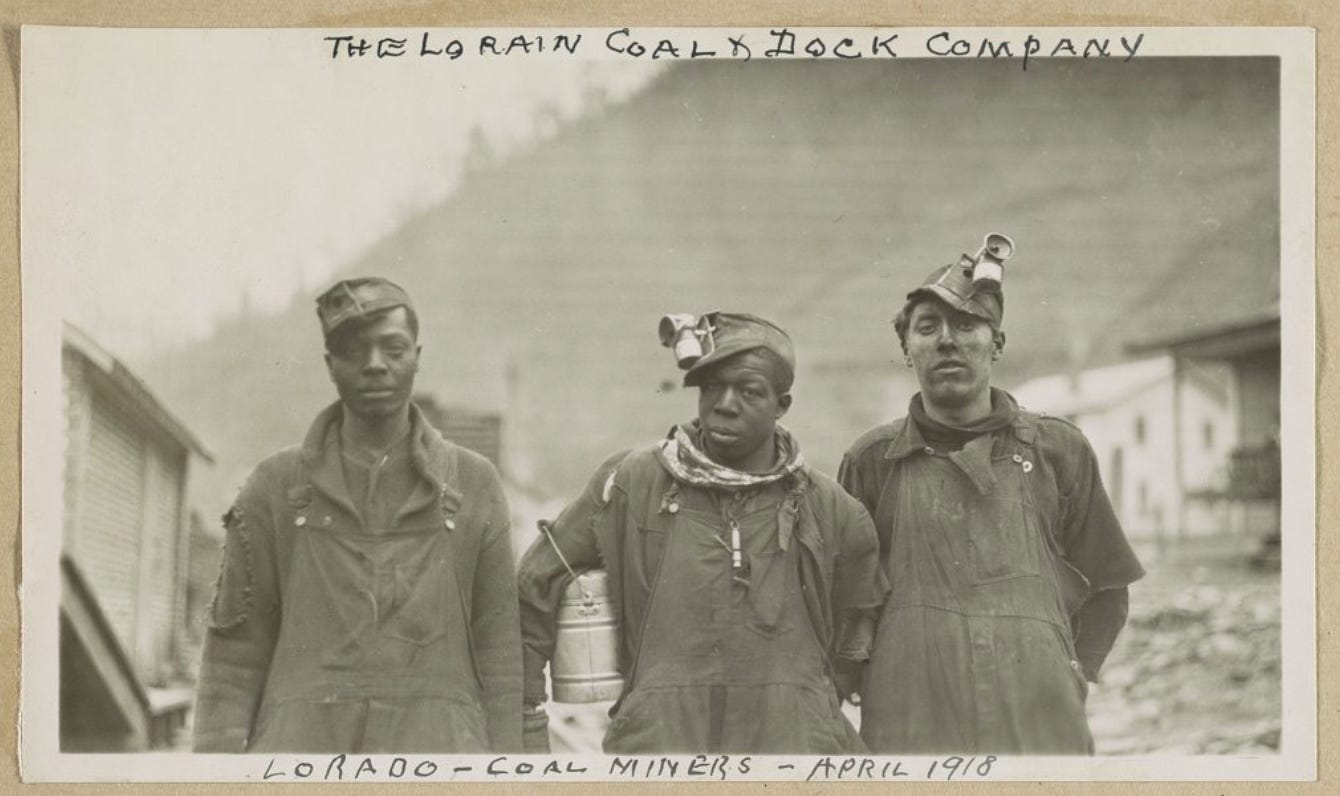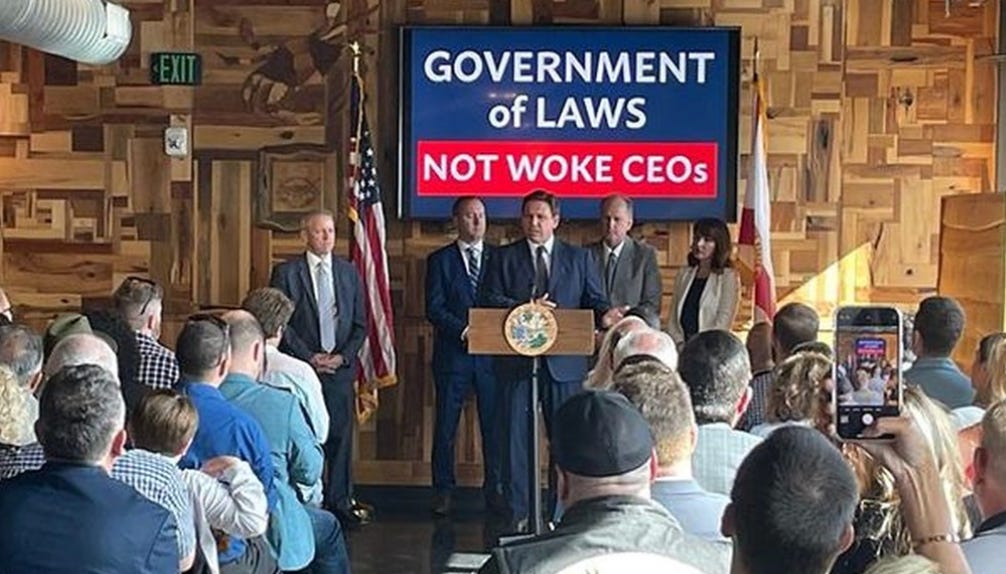What We Talk About When We Talk About "Woke"
It's a bad faith, lazily appropriated playground insult. But that doesn't mean we shouldn't try to understand its emotional appeal
It wasn’t the press conference that broke me.
If a Newsmax reporter wants to ask if an 80 year old White man from Delaware is “woke,” that’s fine. Silly, but fine. So too when Ron DeSantis did that tough guy walk of his up to one of his omnipresent Declarative Podiums to bellow on about how that the Sunshine State is where “woke comes to die.” Or when Arkansas Governor Sarah Huckabee Sanders utilized her prime time State of the Union response to workshop a particularly forced version of the old rhetorical “my opponent is ____ but I on the other hand am _______” rope-a-dope.
“I’ll be the first to admit President Biden and I don’t have a lot in common. I’m for freedom. He’s for government control. At 40, I’m the youngest governor in the country, and at 80 he’s the oldest president in American history. I’m the first woman to lead my state, and he’s the first man to surrender his presidency to a woke mob that can’t even tell you what a woman is.”
None of that bothered me. It was silly. It was dumb. It was so much trumped-up political puffery. It was easy to write off.
And sure, I knew that there was a through line between the nonsense and real bills with real world consequences. I knew that DeSantis had championed the “Stop W.O.K.E. Act” bill— a ban both on whatever it is they’re calling critical race theory as well as mandatory workplace diversity trainings (if you’re curious, W.O.K.E. stands for Wrongs to Our Kids and Employees and oh goodness this is all so embarrassing). But DeSantis and his buddies in Tallahassee have passed a ton of cruel, draconian bills, most of which haven’t had sneering, jokey names.
The term “woke" finally stopped me in my tracks a bit over a week ago. I had been reading about the beautiful life and tragic death of Jen Angel, the Oakland-via-Ohio baker and activist who died on February 9th from injuries sustained in a robbery attempt three days earlier. There have been a number of wonderful tributes to Angel, and rightfully so. It’s clear that she lived a life of kindness, compassion and righteous action. Among her many convictions, she was a police and prison abolitionist. As such— after her death— friends and family made a public request that her assailants not face jail time for their crimes. That request somehow found its way to the conservative news ecosystem, which is how I ended up reading a snarky New York Post article that identified Jen Angel as a “woke California baker” and the anti-carceral request as a “startling plea.”
A “woke California baker,” damnit. Not a human being whose values might be honored in her death. Just a “woke California baker.” Somebody who had it coming. Somebody whose message doesn't needed to be heeded. Somebody who was, herself, the problem.
That’s what got me.
There are two different ways to tell the story of how we got here.
There is, of course, the cultural appropriation story, because virtually all rhetorical stories are cultural appropriation stories. Before “woke” was conservative slang, it was Black slang generally, and Black activist slang specifically. In 1938, the blues musician Leadbelly told listeners to “stay woke” as a postscript to his protest song about the Scottsboro Boys (four Black men who had been falsely accused of the rape of a White woman). Two years later, members of the Negro United Mine Workers union were exhorted to “stay woke” by union activists who discovered that they were being paid half as much as their White counterparts. For decades, woke existed within Black communities, sometimes in its exhorative form, sometimes as a self-descriptor, and sometimes as an affectionate-but-joking descriptor for activists who were particularly strident and about that life. Woke was family business.
It took the post-Ferguson, social media-fueled Black Lives Matter movement to bring the word to mass (White) consciousness. Once there, it suffered the same fate as so many turns of phrase with their roots in Black and/or Queer spaces: “woke” suddenly became the domain of straight White mass culture. In 2016, MTV included it on a laundry list of cool new slang terms (alongside “lit” and “keep it”) whose adoption, it was inferred, could distinguish a speaker from their uncool, less with-it peers (who, back in 2016, were apparently still saying “on fleek”).
White people love having consistent, constantly updated access to hip-adjacent slang terms. It is one of our many salves when the inherent culturelesness of Whiteness fills us with jealousy and emptiness. We deploy our new discursive playthings half-seriously, half-ironically, like the be-khakied suburban dad saying “fo shizzle” with a self-satisfied, DeSantian smirk. Hahahaha we aren’t Black, of course. It’s crazy that we’re saying a Black word! But it’s cool that we know it, isn’t it? Isn’t it?
What’s important to remember about White rhetorical appropriation is that once a term is in the White public domain, it’s available to any White person, for whatever purpose we find useful. And so it’s unsurprising that “woke” took off not just with White people in general but with White conservatives in particular. As the Washington Post’s Damon Young has pointed out, since “woke” was an identifiably Black word (and since it described a set of political beliefs that conservatives didn’t like), it was extremely useful (in the same way as “Chicago” has long been useful) as a means for conservatives to trash talk Blacks without saying the word Black.
There’s more at work here than just another cultural appropriation story, though. Conservatives don’t only use “woke” as a synonym for Blackness, but as a more ambitious catch-all for any political belief that runs counter to contemporary conservative orthodoxy. Allowing trans kids to play sports is woke, of course, as is protesting the police. But so too is wearing a mask or raising alarms about climate change or encouraging your employees to attend a diversity training.
In this way, woke is the new “politically correct,” the circa-1990s conservative slur for liberals (the archetypal example being kill-joy hippie feminists, as depicted in PCU, the largely forgotten but once cable-ubiquitous campus-based farce) who were obsessed with diversity and recycling and who would verbally guillotine you for using the wrong term for an oppressed group. Self proclaimed “politically incorrect” truth-tellers on the left and right built mighty, decades-long careers by declaring themselves to be being brave enough to “tell it like it is,” even if doing so might upset an imagined Women’s Studies Major at Wesleyan.
It’s a pretty effective grift, of course. Take a moment of cultural upheaval, make a few observations (some of them warranted, many of them not) about the worst excesses of leftist stridency, invent an annoying enemy that contains all of those excesses and then wrap it in an appropriated rhetorical bow (not surprisingly, the term “politically correct” also has its roots in older radical movements). It’s not new, but it keeps working. And it keeps working because it’s a cheat code that (for true believers) magically makes the most basic human fear— the fear of change— disappear.
Much of the current anti-woke panic is just old 1990s tropes reheated and served back to us. We are apparently obsessed with college activists again (an actual line from our nation’s paper of record this past week: “Some readers might object to dwelling on one instance of misguided sensitivity at one small college when the country is in the midst of a nationwide frenzy of right-wing book bans… But…”). There are new wrinkles this time around, though. Thanks to a spate of largely performative post-George Floyd statements and grandstanding by Fortune 500 corporations, contemporary anti-woke campaigners can claim that not only are they speaking truth to twenty-one-year-olds with septum piercings, but powerful CEOs as well. Have you heard? The Little Mermaid is Black now. So that’s what that Occupy Wall Street crew was warning us about. “Woke” is the status quo. Anti-woke is the vanguard. You’re not being fragile or defensive if requests for pronouns disturb you. You’re a righteous rebel raging against the machine.
The thing is, the past few years have been incredibly destabilizing. Old orthodoxies have been challenged. Change (at least in a theoretical sense) has been in the air. Some of that destabilization is thanks to the decades of struggle by Black, Queer and trans activists to shift policy and public discourse. Some of that destabilization has come from a long line of tragedies: climate catastrophes, recessions and (most acutely) a once-in-a-generation global pandemic. People (particularly White, straight and cis people) have been asked to care about folks outside of our immediate circles in ways that are legitimately new. We have been asked to care about Black liberation. We have been asked to care about the basic dignity of trans people. We have been asked to do things that seem new and inconvenient (wear masks, not attend public events, share resources) in order to keep our neighbors alive.
It is frustrating, of course (particularly for those whose identities are under attack) that any human being would balk at requests for universal care and empathy. For those of us trying to build and sustain movements rooted in that ethic of care, though, we must remember that our neighbors are not our enemies simply because they’re wrestling with change. The real villains here are those who build careers and amass power from hearing those fears and meeting them with narcoticizing scapegoats.
That’s why “woke” as a conservative bogeyman is so dangerous. It sees the exact moment that a wide swath of the population is asked to become more caring and instead tells them not only that they can safely ignore those pleas, but that it is their duty to kill the messengers. The problem (according to the anti-woke grifters) isn’t injustice, it isn’t that we’ve all been sold a lie about how the world works. It’s the “woke mob.” They’re the ones who are intolerant, since they won’t let you maintain your comfort and your familiar prejudices. They’re the ones who are totalitarian, since they will restrict your freedom to bury your head in the sand. They’re the ones who are brainwashed, because… well… they have to be. The only other possibility would be too hard to bear. Don’t worry about that, though. Stick with the reactionary status quo and you’ll never be asked to change and nothing will ever hurt.
The conservative anti-woke chorus is cartoonish, but that doesn’t make it any less dangerous. It robs everybody who believes in it of our full humanity, of our full ability to love. We hear about a baker in Oakland who lost her life tragically, but who never gave up her convictions. Since those convictions are intimidating and scary, though, since wrestling with them would require so many of us to rethink our own values, the anti-wokers are there to whisper in frightened ears: “You don’t really have to care about her; you don’t have to seriously consider the social ethic that animated her life. She’s just another member of the woke mob. Good riddance.”
There are multiple traps here for those of us who crave a more just, more caring world. The first would be to just write off anti-woke discourse as silly, bull-headed buffoonery. It’s an easy one to fall into, what with Tucker Carlson going to war against M&Ms and the richest man in the world buying a social media network and then mostly using it to complain about how something called the “woke mind virus” is preventing people from thinking he’s funny and cool. It’s ridiculous stuff! I would love to just mock it! The impact is real, though. For all its buffoonery, anti-wokeness does, in fact, respond to real human cravings for comfort and stasis.
The second trap would be to cede this conversation to the anti-woke grifters. It would be to allow that crowd an uninterrupted audience with White parents who don’t know how to discuss racism with their kids or with cis grandparents who want to accept their trans grandchildren but who spent sixty years learning simplified myths about gender. It would be to accept the dichotomy that— depending on your political beliefs— you’re supposed to sympathize with Black people drinking poisoned water in Flint, Michigan or White people drinking poisoned water in East Palestine, Ohio, but not both.
The thing about “woke” is whatever it once meant, it now means being asked to care for everybody— even when it’s hard, even when it’s confusing, even when that threatens your world-view. That’s pretty lovely, actually. And that doesn’t mean that we have to reclaim the term. We’ve got bigger battles to fight than the right to say “woke” unironically. It does mean, though, that when you hear a loved one toss that word off as a slur, that you remember that what you’re hearing isn’t bravado but fear. We use words like “woke” when we’re afraid of loving more deeply. We use words like “woke” when we’re afraid of extending our care to somebody different than us. And that’s tragic, of course, but it’s also an opportunity. Hatred is nearly impossible to transform. Fear isn’t, though. Fear is an ellipsis. Fear is an invitation. Fear is a desire to be heard. And hearing that fear, in turn, is a first step towards transforming it into empathy.
End notes:
Jen Angel’s friends have set up a GoFundme in her honor, with funds going to support her family and bakery.
Song of the week:
“Scottsboro Boys” by Leadbelly. Some day, in the future we’re building, our grandchildren will only know the term “woke” from this song. This essay and everything it describes won’t make a lick of sense.
As always, you can find the collected song of the week playlist on Apple Music or Spotify.









Thank you Garrett. I've been wanting to write about wokeness, and you've helped provide some excellent history and perspective. And more than anything, I appreciate your closing statement: "Hatred is nearly impossible to transform. Fear isn’t, though. Fear is an ellipsis. Fear is an invitation. Fear is a desire to be heard. And hearing that fear, in turn, is a first step towards transforming it into empathy."
Beautifully said.
The tributes to Jen Angel have been really beautiful. I didn't know her, but we're pretty likely only a degree or two apart socially (zine world is small). It's awful to see her death and her values weaponized in culture war bullshit, but I hope it also causes at least a couple people to think about care and abolition and how to be a brighter light in the world.